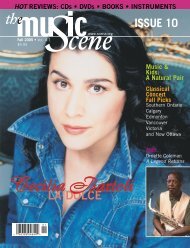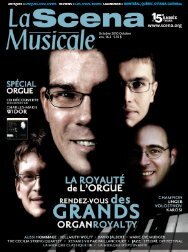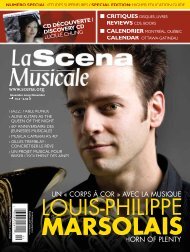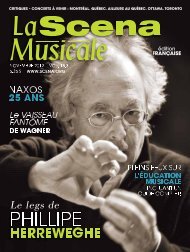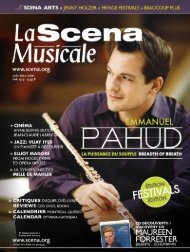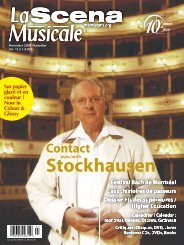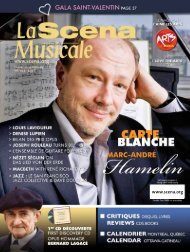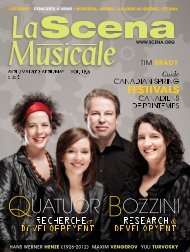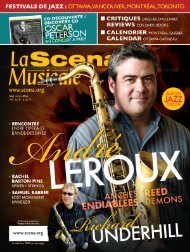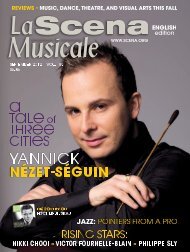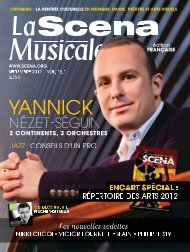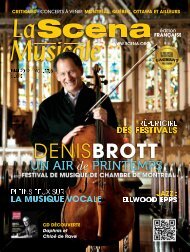You also want an ePaper? Increase the reach of your titles
YUMPU automatically turns print PDFs into web optimized ePapers that Google loves.
ON THE COVER<br />
the Société de musique contemporaine<br />
du Québec is<br />
putting the spotlight on composer<br />
Ana Sokolović this<br />
year for the third season of<br />
their Série Hommage, previously devoted to<br />
Claude Vivier and Gilles Tremblay.<br />
Born in Belgrade in 1968, the composer<br />
grew up in a creatively and culturally rich<br />
environment that gave her the opportunity,<br />
while still very young, to learn ballet, take<br />
piano lessons and act. She has been composing<br />
music for the theatre since her teen<br />
years.<br />
After studying composition at the University<br />
of Novi Sad and at the University of<br />
Belgrade, she taught for a few years before<br />
deciding to emigrate to Canada in 1992. She<br />
completed a Master’s Degree in composition<br />
at the Université de Montréal with José<br />
Evangelista and married Jean Lesage, a fellow<br />
composer.<br />
For this neo-Quebecoise, Montreal is an<br />
ideal environment for new music to flourish.<br />
“Here, we are very closely linked to Europe,<br />
but there is a liberty in North America that<br />
Europeans do not have. The burden of tradition<br />
and judgment weighs little here; there<br />
is an extraordinary open-mindedness that<br />
doesn’t exist anywhere else in the West. I am<br />
extremely happy to be able to work here.”<br />
Ana Sokolović’s work is rich and diverse;<br />
opera, chamber music, theatre and dance<br />
music, and pieces for solo instruments have<br />
all crossed her creative path. Many prestigious<br />
ensembles and soloists, for example<br />
the MSO and the Ensemble contemporain<br />
de Montréal, have commissioned pieces<br />
from her and performed her works.<br />
The public will discover Sokolović’s colourful and original<br />
music, infused with the cultural baggage of her native country,<br />
thanks to more than 80 concerts and activities across the country<br />
that are part of the Série Hommage.<br />
Opera, the universal language<br />
Ana Sokolović has already written three operas, all of which<br />
were premiered in Toronto by the Queen of Puddings Music<br />
Theatre company.<br />
For her most recent opera, Svadba, which means “marriage”<br />
in Serbian, she drew on the model of Stravinsky’s Noces, which<br />
tells the story of a peasant marriage in Russia. In this work for<br />
six female voices, Sokolović concentrates on the moments that<br />
come before the marriage, on what we call a bridal shower in<br />
North America. Her primary source: songs and texts related to<br />
this ritual at different times in the history of her native Serbia.<br />
“It was very difficult to find texts, but I did succeed in finding,<br />
for example, a song used while<br />
the hair of the bride was coloured.<br />
I wrote the libretto myself, drawing<br />
on my research. I learned<br />
that the ritual of preparation for<br />
Ana Sokolović<br />
A Chronology<br />
1968: Birth in Belgrade<br />
1979: Actress at the National<br />
Yugoslav Theatre<br />
1980-1981: Television program<br />
presenter<br />
1986-1990: Studies in music at<br />
the University of Novi Sad<br />
1992: Move to Montreal<br />
1993-1995: Master’s Degree in<br />
composition at the Université<br />
de Montréal<br />
1995-1996: First professional<br />
concerts in Montreal<br />
1996 à 2011: Composition and<br />
premieres of around forty works<br />
in Toronto, Montreal, Winnipeg,<br />
London, Halifax, and Banff<br />
marriage lasted seven days, so there are seven scenes in my<br />
opera. They include everything that can happen when you’re<br />
very nervous during the preparation for an important event:<br />
funny moments, touching ones, confrontation.”<br />
The work was premiered last summer in Toronto. Sung a<br />
cappella in Serbian, with English surtitles, it was described as<br />
a tour de force by critics and was very well received in general.<br />
“Even if it’s in Serbian, the theme is very universal,” says the<br />
composer. “There are surtitles, of course. Nevertheless, what<br />
matters most is not whether one understands all the words but<br />
whether one understands emotionally what is going on. I incorporate<br />
made-up language and onomatopoeia into the piece.<br />
I play extensively on the rhythms of the language; its colour and<br />
DECEMBER 2011 / JANUARY 2012 5



